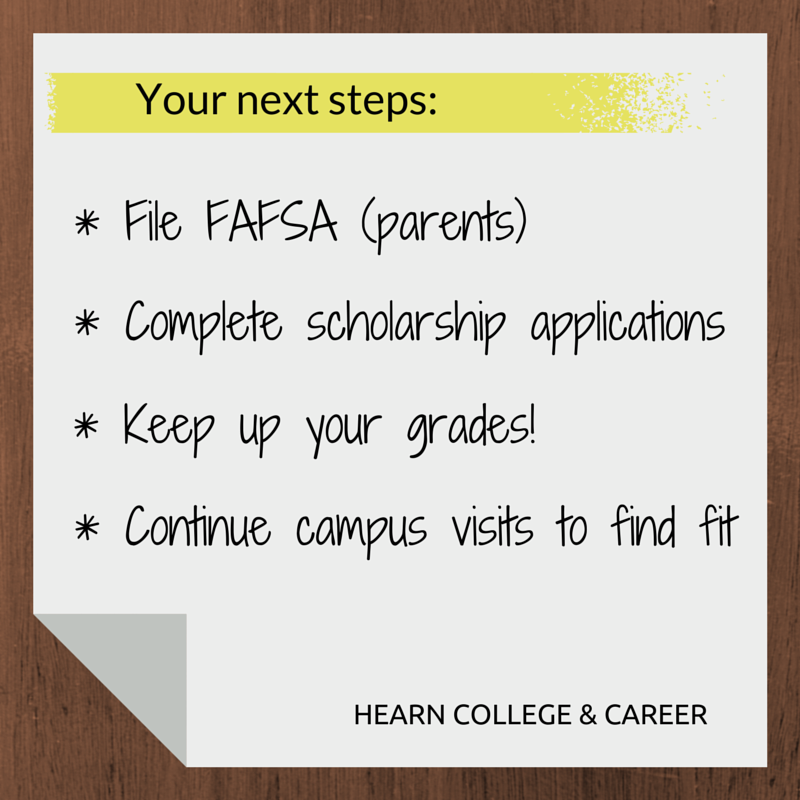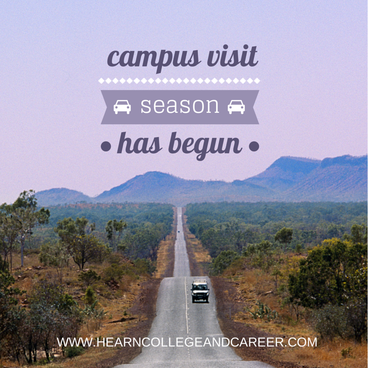|
"Meaningful interaction" was the core of my workshop last week with parents learning about the college admission process. The announcement of this new application makes my focus even more critical.
0 Comments
Question of the day: My daughter has the flu and cannot attend her prescheduled visits to two of her top schools over break. Will she hurt her chances of being admitted if she is a no show?
The fear of not showing adequate interest to a college during the admissions process is a frequent hot topic during this time of the year. With decisions for admission pending, students rely on campus visits as a primary means to demonstrate their high level of interest in a college. Behind the scenes, admissions staff use this tracking as a tool to predict yield (the percentage of admitted students who enroll in a college). While these students are correct in their belief that some colleges do track applicant contact to gauge eagerness to attend, not all do. According to a study by the National Association for College Admission Counseling, roughly half of all colleges and universities place either moderate or high importance on an applicant's interest in attending the school. Those institutions not using demonstrated interest as a factor in the admission process believe campus visits better serve as a means of helping students make an informed choice about their college plans. My advice? Do a little research to find out whether or not the colleges to which you are applying put much weight on demonstrated interest. If they do, campus visits are merely one of the several ways to achieve this task. Check out these additional useful options: High School Visits – Admissions counselors routinely travel throughout the admission season to visit students giving you excellent opportunities to connect with representatives from the colleges of your choice. Mailing List – If you haven’t had an opportunity to connect with a representative at a college fair, but sure to provide your information online to join the mailing list. College Fairs – Stop by the booths of the colleges you are interested in to introduce yourself and provide your contact information. College Interviews – If the interview is optional, do it. The interview is an excellent opportunity to demonstrate your interest and fit. Don’t overlook interview opportunities with a student or alum, too. Thank You Notes - If you connect with a college representative, do send an email the next day to thank him/her for meeting with you. Be sure to include one or two aspects of the college that appeal to you. Want to make a great impression? Send a handwritten note. Apply Early – If you are very certain about your college list, applying early is a clear sign of interest. With two options available in the early admission process, Early Decision and Early Action, be sure you are clear about the objectives of each. While both options involve an earlier application deadline than regular admissions and earlier notification of admissions decisions, Early Decision programs are usually binding. Supplemental Essays – While Common App essays can be used for any school accepting the application, supplemental essays are an opportunity to let you shine and demonstrate your interest. As with any writing you are submitting during the application process, be sure to answer the question you are being asked in the supplemental essay with a concise, well-crafted response. I really appreciate that you are reading my post. I regularly write about career development and college success. If you would like to read my regular posts, please visit my Facebook page and click the "like" button to follow me. You can also connect with me via Twitter, LinkedIn, and Google+. By Amanda Collins
From virtual tours to online applications, when it comes to college, high school students make many important decisions with the click of a mouse. But so do the people on the other side of the process, warns a local college and career counselor, who says that online presence is increasingly becoming a two-way street in the college application process. “This is huge for students during the admission process,” said Michele Hearn, a member of the New England Association for College Admission Counseling. She offers personalized career and college counseling online to people across the country, and to locals right at her Sutton-based business, Hearn College and Career. “One of the first items I cover in college counseling before applications go out is the subject of cultivating a positive online presence. While not all admissions committee members check student profiles online, many admit that they do.” According to a study by Kaplan Test Prep, at least 35 percent of college admissions officers look at candidates’ online profiles on social networking sites. But in the same study, more than half of students queried said they didn’t think their online presence would be a factor in whether or not they got in to their school of choice. “Students need to know that whatever they post or are tagged in is public information and may be used in the decision process,” said Hearn. She explained that admissions counselors want to know more about the person behind the application. “A lot of candidates can look very similar on paper, when you’re just looking at a list of grades and test scores. Admissions officers want to know more about the person, their story, their goals, and how they’ll fit at a school,” she said. Instead of letting Facebook photos or tweets do the talking, Hearn recommends students focus on sharing their story in their college essay. “It can be a daunting task, but sometimes people underestimate the power of an essay. It’s the students chance to tell a story only they can tell,” she said. “It’s not just about being concise and well-written – it can be much more than that. It’s something that should take time and effort.” Hearn recommends students start thinking about the future long before filling out applications and typing up essays. She works with students from junior high school through college to explore career ideas because she said having an understanding of your interests and strengths is a key to success. The College Board recommends that students start thinking about college as early as ninth grade. Experts there suggest students find a mentor who they can talk to about their goals and go to for advice on mapping it out. “I’ve never worked with a student or job seeker who said it wasn’t worth their time to talk to someone who can help them identify their strengths and put their best foot forward,” she said. “Support along the way can save you time and worry and move you forward with efficiency and sanity.” Hearn helps clients in-person and online in personalized and confidential sessions. For more of her tips or to arrange a free consultation, visit hearncollegeandcareer.com, or contact her at 508-277-2944 or hearncollegeandcareer@gmail.com. Question of the day (more like question of the month!): "I hate standardized tests. Can I still apply to college?"
Answer: Absolutely. According to the National Center for Fair and Open Testing, over 800 colleges and universities across the country do not use the SAT or ACT to admit substantial numbers of bachelor-degree applicants. Check out their website for a searchable database and more information about how colleges become "test optional". It’s almost the holidays – have you booked your campus tour? School vacations are an unusually busy time of the year for guided tours as prospective students take advantage of days off to visit campus. If you have yet to schedule a campus tour or are trying to schedule and finding everything booked, fear not. Campus visit season – typically the summer before junior year throughout the fall of senior year (even earlier if a student expresses interest) – provides many opportunities to research colleges. Here are my best tips for making this season a successful one:
Embrace the initial stage you are in. Campus visits are best thought about in stages before, during, and after the application process. Knowing your stage helps you plan effectively and maximize your options. For those in the pre-application stage, this initial period is all about research. Online resources, including the campus website and virtual tour, high school information sessions, and college fairs are cost-effective, efficient ways to gather initial information about colleges of interest to you. Spend time each month enjoying these resources to get a sense of institutional match (a college or university's academic suitability for you) and fit (beyond academic considerations to include your financial, personal, and social needs). Time your visit well! The selection and application process is an excellent time to physically visit the campus and meet with campus resources. Open houses and self-guided tours are valuable ways to experience the campus culture and better assess fit. Prioritize these visits during the weekday to get a true glimpse of student activity and academics while classes are in session (be sure to check the academic calendar to avoid readings days or exams). Schedule meetings and prepare smart questions. A month before your visit, check out the college website to learn about specific department and office hours and the best way to schedule an informational meeting. Prepare a list of questions and always double check to ensure the answers are not easily found on the website – better to arrive with a short list of unique questions to discuss than a long list of common FAQs. Prepare to return if accepted. The decision making process typically merits another visit to campus to make a final choice. Plan on attending programs for accepted students and if given the option, stay overnight. If you haven’t already done so, eat in the dining hall, talk to current students, hang out in the student center, and sit in on a class. You’ll want to consider all of this information before making your final choice while trusting your gut instinct about your best fit. |
Categories
All
AuthorCounselor. Mentor. Dream Developer. I am a veteran college and career consultant helping clients of all ages prepare and perform for success! Archives
September 2015
|
Proudly powered by Weebly


 RSS Feed
RSS Feed